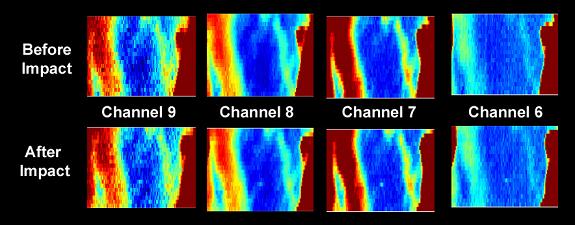This article is more than 1 year old
Moon orbiter detects pole-plunge hotspots in dark bottom
NASA: LCROSS may have caused 'significant heating'
Damp squib may nonetheless have caused 'significant local heating'

Roughly what you'd see if you let off a large bomb in the Cabeus crater.
According to boffin David Paige, boffin-in-charge of the team operating the Diviner thermal scanner mounted on the LRO, the pics above indicate that the LCROSS strikes may not have been the damp squibs they appeared to be visually. As the orbiting spyeye passed above Cabeus just after the impact, it detected two distinct hotspots where the Centaur and the LCROSS Shepherding Spacecraft (SSC) follower drilled in. NASA says this should have resulted in an energy release roughly equivalent to a ton and a half of TNT detonating.
According to Paige, writing at the Diviner blog:
The thermal signature of the impact was clearly detected in all four Diviner thermal mapping channels. Since the LCROSS impact feature is predicted to be significantly smaller than a Diviner footprint, its detection is consistent with the notion that the LCROSS impact resulted in significant local heating of the lunar surface.
Even if very little debris was actually thrown up by the strikes, heating of the surface is good news for the NASA boffins as it should mean that they can get a better analysis of how much water may have been present around the impact sites.
No firm word on the exploitability of the possible ice reserves of the lunar antarctic is expected for some time, however. Meanwhile, NASA is embroiled in a massive bureaucratic effort to decide on a way forward for its manned space programme, as the US government has not budgeted enough money for the planned Constellation rockets'n'spacecraft programme. Constellation was intended to supersede the Space Shuttle and then take humans back to the Moon and onward, perhaps, to Mars. ®
